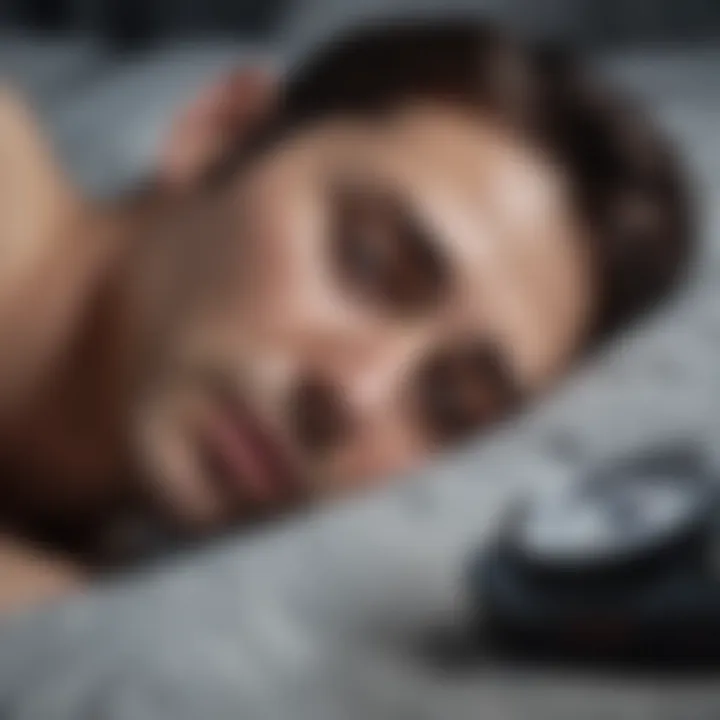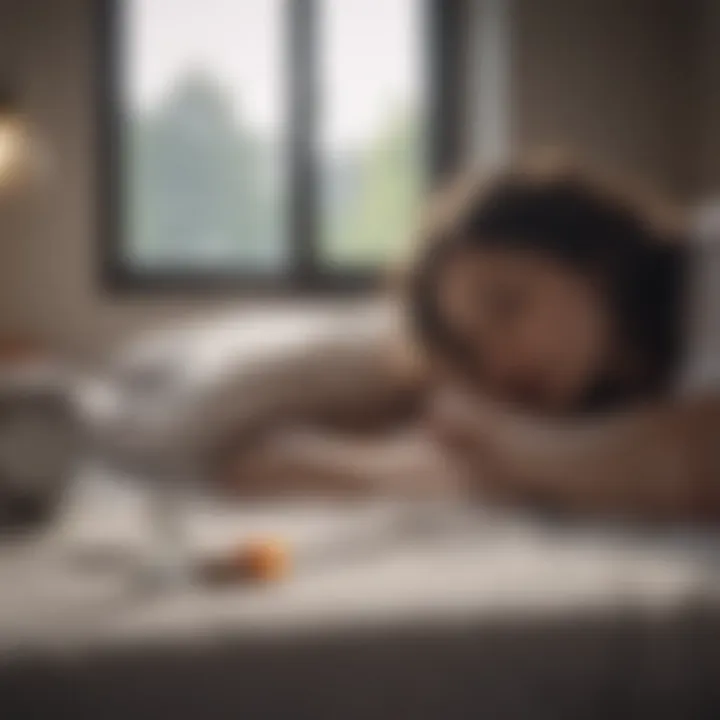Exploring the Roots of Persistent Wakefulness


Intro
In recent years, the issue of lack of sleepiness has emerged as a pressing concern within modern society. Individuals often experience difficulties in feeling tired, contributing to various health and productivity challenges. Understanding the reasons behind this phenomenon is critical for both individuals attempting to manage their sleep patterns and for professionals in healthcare and education.
This article provides a systematic exploration of the underlying causes of lack of sleepiness, encompassing a range of biological, psychological, and environmental factors. By examining current research findings, we aim to shed light on the mechanisms that dictate sleepiness and provide actionable insights into potential interventions. The effects of lifestyle choices, such as diet and exercise, will also be discussed to paint a complete picture of this complex issue.
Research Highlights
Key Findings
- Biological factors: Research indicates that neurotransmitters such as adenosine and melatonin play a crucial role in regulating sleepiness. Disruptions in these systems can lead to difficulty in feeling tired.
- Psychological influences: Stress, anxiety, and even depression can significantly affect an individual’s sleep patterns. Psychological states often dictate the body's ability to relax and transition into sleep.
- Environmental conditions: External stimuli such as light, noise, and temperature can impact the sleep-wake cycle. Understanding these elements can provide pathways towards improving sleep quality.
"Sleep is not merely a time of rest; it is a complex process influenced by numerous factors that require deep understanding to manage effectively."
Implications and Applications
- For individuals: Knowledge of one’s biological clock could inform better sleep habits.
- In education: Understanding sleepiness-related issues could help educators develop strategies to support students in achieving optimal focus and learning outcomes.
- For healthcare professionals: By recognizing the multifactorial causes of lack of sleepiness, providers can create tailored interventions that address the specific needs of their patients.
Methodology Overview
Research Design
This article synthesizes literature reviews and recent studies examining sleep patterns. The approach ensures a holistic view of the influences contributing to lack of sleepiness. This includes qualitative data from surveys and quantitative studies assessing biological markers.
Experimental Procedures
Research reviewed involves a variety of experimental designs. Controlled laboratory studies measure sleep latency under differing environmental conditions. Surveys assess psychological health factors that contribute to sleep disturbances.
Ultimately, a comprehensive examination of these variables allows for a better understanding of how they collectively influence sleepiness. This knowledge is invaluable for individuals seeking to enhance their quality of life and for experts aiming to address sleep-related issues in various settings.
Prelude to Lack of Sleepiness
The phenomenon of lack of sleepiness is gaining interest in today's fast-paced world. As society puts greater demands on individuals, understanding the dynamics of sleepiness becomes essential. Various factors contribute to feelings of alertness or drowsiness. This article delves into these factors, exploring biological, psychological, and environmental elements.
Defining sleepiness accurately is vital for discussing its implications. Knowing what it means to feel sleepy helps in identifying potential issues when someone does not feel tired. Moreover, as we discuss the importance of understanding sleepiness, we will highlight how pervasive this issue is among diverse population groups. Grasping the reasons behind lack of sleepiness can lead to better health outcomes and enhance general productivity.
Understanding sleepiness is also crucial for developing effective strategies to address it. By recognizing the various causes, individuals can take proactive steps to manage sleep-related problems effectively. For example, engaging in lifestyle adjustments may reduce instances of fatigue and therefore increase one’s efficiency at work or school. Consequently, awareness of sleepiness can have far-reaching benefits, improving quality of life.
Definition of Sleepiness
Sleepiness, in its simplest form, refers to a state of reduced awareness and alertness. It is often characterized by a strong desire to sleep. This condition arises due to both physiological and psychological processes. Sleepiness can vary in intensity based on various influences. For many, it is felt after long periods of wakefulness or intense mental effort. However, feeling sleepy does not always correlate with actual fatigue. While people may appear alert, underlying factors may lead to a lack of sleepiness, thus affecting overall performance.
Importance of Understanding Sleepiness
Understanding sleepiness has far-reaching implications. It enables healthcare professionals to assess and manage sleep disorders effectively. With rising sleep-related complaints, knowledge in this area is crucial for both prevention and intervention. Here are some reasons why grasping the concept of sleepiness is important:
- Health Outcomes: Chronic lack of sleepiness can impact physical health, leading to conditions like heart disease and diabetes.
- Mental Wellbeing: Sleepiness can indicate underlying mental health issues. Addressing it helps promote emotional stability.
- Work Efficiency: By recognizing factors contributing to sleepiness, organizations can implement changes to improve productivity.
- Education: Understanding sleep patterns aids educators in supporting students, ensuring optimal learning conditions.
"Lack of sleepiness is not just a minor nuisance but a significant health concern that affects multiple facets of daily life."
Overall, a comprehensive understanding of sleepiness enriches individual awareness and promotes communal approaches to address the associated challenges.
Biological Factors Influencing Sleepiness
Biological factors play a crucial role in influencing sleepiness. Understanding these factors helps to grasp why some individuals may experience a lack of sleepiness while others do not. Sleepiness is not just about feeling tired; it involves complex biological rhythms and hormonal responses that govern how alert we feel. Recognizing these factors can guide effective interventions and enhance overall well-being.
Circadian Rhythm Disruptions
Circadian rhythms are the body’s natural clock, regulating the sleep-wake cycle over a 24-hour period. Disruptions to these rhythms can significantly impair sleepiness. Various elements such as shift work, travel across time zones, and irregular sleep schedules can disturb these cycles. When disrupted, the body may struggle to signal sleepiness at appropriate times, leading to excessive wakefulness during the night.
Research indicates that individuals exposed to artificial light, especially blue light from screens, can further exacerbate circadian disruptions. This can lead to a decrease in the hormone melatonin, which is crucial for inducing sleepiness. Therefore, maintaining a regular sleep schedule and limiting exposure to screens before bed can help mitigate these disruptions.
Hormonal Influences


Hormones significantly influence feelings of sleepiness. Key hormones involved include melatonin, cortisol, and adenosine. Melatonin, produced by the pineal gland, is primarily responsible for signaling to the body that it is time to sleep. A lack of melatonin production can lead to difficulty falling asleep and reduced sleepiness.
Cortisol, often called the stress hormone, has a more complex role. Elevated cortisol levels, especially at night, can hinder sleep onset. In contrast, adenosine accumulates in the brain during wakefulness and promotes sleep pressure. The interplay between these hormones is intricate. Understanding hormonal influences provides insights into potential treatments for sleep disorders.
Genetic Predispositions
Genetic factors can also play a part in one's tendency to feel sleepy. Some individuals may possess gene variants that affect their circadian rhythms or the way their body responds to sleep-depriving conditions. Certain genes are linked to sleep disorders like insomnia or hypersomnia, which can hinder the natural process of feeling sleepy.
Studies suggest that genetic tests could potentially identify those at higher risk for sleep issues, allowing for early interventions. Additionally, understanding individual genetic predispositions can help tailor strategies to manage sleepiness more effectively.
"Researchers are exploring the genetic bases of sleep disorders, aiming to pave the way for personalized treatments tailored to individual needs."
Overall, biological factors are foundational in comprehending the nuances of sleepiness. From circadian rhythms to hormonal changes and genetic influences, recognizing and addressing these factors is essential for improving sleep health.
Psychological Contributors
Understanding psychological contributors is crucial for addressing the issue of lack of sleepiness. Many people overlook the influence of mental factors on sleep behavior. They often focus solely on physical health or environmental aspects. However, psychological elements can significantly affect our ability to feel sleepy. Exploring these factors clarifies some of the complexity behind sleepiness and can lead to more effective interventions.
Mental Health Disorders
Mental health disorders play an important role in the lack of sleepiness. Conditions such as depression and bipolar disorder can disrupt normal sleep patterns. They may cause hyperarousal or excessive energy, making it hard for individuals to feel tired. Furthermore, people suffering from anxiety disorders may experience racing thoughts. This overactivity of the mind prevents the body from naturally transitioning into rest. Research shows that treating these disorders often alleviates sleep issues. For example, cognitive-behavioral therapy (CBT) can be effective. This therapy addresses the negative thought patterns that contribute to chronic sleep problems.
Stress and Anxiety Levels
High levels of stress are another psychological contributor to lack of sleepiness. When a person is stressed, the body releases stress hormones such as cortisol. Elevated cortisol levels can keep the body in a state of alertness. This physiological response disrupts sleep cycles, making it challenging to unwind and feel sleepy. Moreover, chronic anxiety can create a vicious cycle. Anxiety may lead to sleep difficulties, resulting in more stress due to sleep deprivation. It is essential to prioritize stress management techniques. Some effective methods include mindfulness meditation, deep breathing exercises, and physical activities. Integrating these practices can improve overall sleep quality.
Cognitive Load and Sleepiness
Cognitive load refers to the amount of mental effort being used at any given time. A high cognitive load can lead to mental fatigue, but it might not necessarily coincide with feeling sleepy. In fact, heavy mental engagement can cause heightened alertness. Activities that require intense concentration can prevent a person from recognizing their need for sleep. This phenomenon is especially evident in students and professionals who work long hours. Balancing cognitive demands with adequate breaks is critical for maintaining sleepiness. Techniques such as the Pomodoro Technique, which emphasizes focused work sessions followed by short breaks, can help manage cognitive load.
"The interplay between mental health, stress levels, and cognitive load reveals the intricate dynamics behind sleepiness. Addressing these can lead to better sleep outcomes."
In summary, psychological contributors to lack of sleepiness are multifaceted. Addressing mental health disorders, managing stress, and balancing cognitive load are vital steps toward enhancing sleepiness. By understanding these psychological aspects, individuals can implement targeted strategies to improve their overall sleep quality.
Environmental Influences
Environmental influences significantly shape an individual's experience of sleepiness. Understanding these factors is crucial for both researchers and practitioners looking to improve health outcomes. Factors such as the work environment, exposure to light, and the quality of sleep environment all affect the way people experience sleepiness. These elements are often overlooked, yet they hold substantial sway over an individual's productivity and well-being.
Work Environment Conditions
The work environment can be a major contributor to the levels of sleepiness an employee experiences. Occupational settings that are excessively noisy or poorly lit may lead to fatigue and a reduced ability to concentrate. For instance, an office filled with constant background chatter or mechanical sounds can be quite taxing on attention and alertness. Likewise, inadequate lighting conditions, such as bright fluorescent lights or dim environments, can alter circadian rhythms, leading to increased sleepiness during waking hours.
Key considerations regarding work environment conditions include:
- Ergonomics: A workstation that is uncomfortable can contribute to physical strains, impacting sleep quality.
- Break Frequency: Regular breaks can alleviate fatigue and enhance alertness. Overlooked or skipped breaks can exacerbate feelings of tiredness.
- Social Dynamics: A supportive work culture can reduce stress and enhance energy levels, whereas a toxic work environment may increase anxiety and decrease overall sleepiness.
Exposure to Light
Exposure to light plays a pivotal role in regulating sleep-wake cycles. Natural sunlight helps maintain circadian rhythms. Individuals working in poorly lit environments, or who are frequently exposed to artificial blue light from devices, may experience disrupted sleep patterns. This disruption can lead to a lack of sleepiness when it is time to rest.
Several aspects of exposure to light are worth noting:
- Natural Light: Increased exposure to daylight improves mood and alertness. A lack of natural light can lead to feelings of lethargy.
- Screen Time: Excessive exposure to screens before bedtime can lead to difficulties falling asleep. The blue light emitted by devices interferes with melatonin production, a hormone that regulates sleepiness.
- Light Manipulation: Using tools like blackout curtains or light therapy lamps can help manage exposure, promoting better sleep quality at night.
Sleep Environment Quality
The quality of the sleep environment heavily influences the ability to fall asleep and stay asleep. A cluttered or uncomfortable bedroom can lead to disruptions in sleep, making it difficult to feel rested. Factors such as noise, temperature, and bedding choice all play significant roles in achieving a good night's sleep.
Considerations regarding sleep environment quality include:
- Noise Management: White noise machines or earplugs can help mitigate disruptive sounds.
- Optimal Temperature: A cooler room temperature is generally more conducive to sleep. Room heat can increase discomfort and affect sleep patterns.
- Bedding: Choosing a mattress and pillows that meet personal comfort preferences can significantly enhance sleep quality. Poor quality bedding can lead to aches and discomfort that can keep a person alert and awake.
"Environmental factors do not exist in isolation; they interact with biological and psychological aspects to contribute to the experience of sleepiness. Understanding these interactions is key for effective intervention."
Lifestyle Choices and Their Impact


Lifestyle choices play a vital role in determining an individual's levels of sleepiness. The habits we cultivate daily, from what we eat to how active we are, can significantly alter our overall health and wellbeing. Understanding how these choices affect sleepiness allows us to make informed decisions that can enhance our quality of life.
Diet and Nutrition
Diet has a profound effect on sleep and alertness. What we consume provides the fuel our bodies need to function effectively. A balanced diet rich in nutrients is essential for maintaining energy levels throughout the day. Foods that are high in sugars can lead to spikes in blood sugar followed by crashes, which can worsen feelings of fatigue. Similarly, consumption of heavy meals right before bedtime might disrupt sleep patterns, leading to insufficient rest.
- Incorporate whole grains: Foods like brown rice and oatmeal can provide sustained energy.
- Consume lean proteins: Chicken, fish, and legumes help promote a better metabolic state.
- Increase fruits and vegetables: They offer vitamins and dietary fiber, crucial for overall health.
Keeping hydrated also influences sleepiness, as dehydration can lead to feelings of fatigue. A well-rounded diet and proper hydration can act as effective tools to combat lack of sleepiness.
Physical Activity Levels
The relationship between physical activity and sleepiness is well-documented. Regular exercise can help regulate sleep patterns and enhance overall sleep quality. When you engage in physical activity, the body releases endorphins. These hormones can elevate mood and reduce stress, contributing to a more restful state during sleep hours.
- Moderate exercise: Aim for at least 150 minutes per week to see positive effects on sleep.
- Incorporate strength training: This can improve physical stamina and energy levels through increased muscle mass.
- Prioritize consistency: Maintaining a regular schedule of activity can signal your body to expect rest at specific times.
Such regular physical engagement is fundamental to ensuring a more balanced approach to sleep and alertness throughout the day.
Substance Use and Abuse
Substance use, including alcohol, caffeine, and recreational drugs, significantly affects sleep patterns and overall health. While these substances may offer temporary relief, their long-term impact can be detrimental to sleepiness levels.
- Caffeine consumption: High amounts, especially in the afternoon or evening, can disrupt sleep cycles and lead to increased sleepiness during the day. It is essential to monitor intake and consider transitioning to decaffeinated options later in the day.
- Alcohol: While it may induce initial drowsiness, alcohol often leads to lighter sleep and frequent awakenings during the night.
- Recreational drugs: Some can directly interfere with the brain’s ability to regulate sleep, causing erratic sleep patterns.
Avoiding or moderating substance use is critical in managing sleepiness and maintaining a healthy lifestyle.
"By shaping our lifestyle choices, we can proactively influence our alertness levels and counteract fatigue effectively."
Technological Impacts
Technological impacts play a crucial role in understanding sleepiness. In today’s digital age, advancements in technology can influence both our sleep patterns and our overall sleep quality. The pervasive use of screens and various sleep aids has warranted a closer examination. This section discusses how technology interacts with sleep, emphasizing two specific elements: screen time and sleep aids.
Screen Time and Sleep Quality
Screen time is a significant factor that contributes to the lack of sleepiness in many individuals. The blue light emitted from devices such as smartphones, tablets, and computers can inhibit the production of melatonin, a hormone that regulates sleep. Melatonin production naturally increases as it gets dark, signaling to our bodies that it is time to rest. However, exposure to bright screens, especially in the hours leading up to bedtime, delays this process.
Moreover, prolonged screen time can lead to overstimulation of the brain. This stimulation can result in difficulty falling asleep and fragmented sleep. Research indicates that excessive engagement with screens not only impacts our ability to fall asleep but also the overall quality of our sleep cycles. Some individuals may find themselves awake longer, unable to wind down properly due to the content they consume or notifications they receive.
"Minimizing screen exposure at least an hour before bed can significantly improve sleep onset and duration."
To improve sleep quality, it is beneficial to establish a digital curfew. Strategies such as using apps that filter blue light or switching devices to night mode can also assist in minimizing disruption.
Impact of Sleep Aids
Sleep aids, both prescription and over-the-counter, have become increasingly common as people seek solutions to their sleep issues. These aids can vary widely in efficacy and come with a host of advantages and disadvantages. While some people find immediate relief from insomnia symptoms, frequent use can lead to dependence. This dependence often results in reduced natural sleepiness.
The impact of these aids on overall sleep quality is complex. Certain medications, while helping individuals to fall asleep, do not necessarily promote the sleep cycles necessary for restorative sleep. Instead, users might find that they experience shallow sleep or regular awakenings throughout the night, ultimately causing them to feel groggy upon waking.
It is essential to approach the use of sleep aids with caution, ideally under the guidance of a healthcare professional. Non-pharmacological interventions, such as cognitive behavioral therapy for insomnia, could provide more sustainable benefits without the side effects associated with medications.
In summary, technological influences, particularly through screen time and sleep aid usage, significantly affect sleep patterns and overall sleep quality. Addressing these issues can lead to improvements in sleepiness and further enhance daily functioning.
The Role of Age and Development
Understanding the role of age and development is crucial in the exploration of lack of sleepiness. Different life stages greatly influence sleep behavior and patterns. As individuals age, their sleep architecture and needs evolve. This section discusses the relevance of age-related changes and developmental patterns that either contribute to or alleviate feelings of sleepiness.
Age-Related Sleep Changes
As people age, their sleep patterns tend to undergo notable transformations. Older adults often experience changes in their circadian rhythm, which can lead to earlier bedtimes and wake times. The percentage of deep sleep also declines with age, causing a lighter sleep state. This change has significant implications. For instance, elderly individuals may find it harder to achieve restorative sleep, resulting in increased tiredness during the day.
Another factor is the increased prevalence of sleep disorders such as insomnia and sleep apnea among older adults. These disorders not only disrupt sleep quality but also amplify the feelings of excessive sleepiness during waking hours. Improved awareness of these age-related changes can help guide interventions and lifestyle modifications that aim to enhance sleep quality, contributing to better overall health.
Developmental Sleep Patterns


Developmental stages impact sleep requirements and characteristics. Infants, children, and teenagers have unique sleep needs. Newborns typically sleep for around 16 to 18 hours a day, experiencing multiple short sleep cycles. As children grow, the total sleep required gradually decreases, but the need for quality sleep becomes more pronounced during teenage years.
Teenagers often experience significant shifts in their sleep patterns, often choosing to stay up later due to increased social and academic pressures. This delay in sleep onset can lead to chronic sleep deprivation, impacting their cognitive performance and overall mood. Educational institutions play a vital role in addressing this issue by promoting awareness and potentially adjusting school start times to align better with adolescents' natural sleep cycles.
Factors such as psychological wellness, physical activity levels, and even academic stress can further affect sleep across all developmental stages. Understanding these patterns is essential for developing effective sleep strategies tailored to each age group.
Innovative Research and Findings
Innovative research into the causes of lack of sleepiness has vital importance for understanding sleep dynamics and their broader implications. As sleep is a fundamental biological function, uncovering the nuances behind why individuals may not feel sleepy can have far-reaching benefits. This section addresses key research advancements and findings in the field of sleep science. It sheds light on how these innovations inform our knowledge and strategies for tackling sleep issues.
Recent Studies on Sleep Science
In recent years, numerous studies have focused on the physiological mechanisms surrounding sleepiness. These studies have revealed critical insights into how biological and environmental factors interact to shape an individual's sleep patterns. One key area of exploration is the role of neurotransmitters in regulating sleep and wakefulness. For instance, the hormone melatonin is well-documented as a signaling molecule that promotes sleep. Recent research indicates a complex interplay between melatonin levels and exposure to light, demonstrating how light pollution can disrupt normal sleep cycles.
Furthermore, studies have tested how chronic sleep deprivation influences cognitive functions and decision-making abilities. Such studies reinforce the significance of quality sleep for mental acuity and overall well-being, highlighting that mere hours of sleep do not guarantee the restorative effects needed for optimal functioning.
Technological Advancements in Sleep Research
The field of sleep research has also greatly benefited from technological advancements. Modern techniques allow scientists to gather data with unprecedented accuracy. Devices like polysomnography and actigraphy track sleep patterns and physiological changes in real-time. Such technologies are essential for clinical studies addressing sleep disorders and lack of sleepiness.
Moreover, wearable technologies have emerged as valuable tools for individual users. Smartwatches and fitness trackers monitor sleep stages, heart rates, and other vitals. This user-generated data contributes to broader scientific inquiries, providing researchers with a wealth of real-world information about sleep habits. The ability to analyze large datasets leads to better understanding of correlations between sleep disturbances, health conditions, and productivity.
The convergence of sleep science and technology has opened new avenues for understanding sleepiness, enhancing our approach to treatment and prevention of sleep-related issues.
Mitigation Strategies for Lack of Sleepiness
Mitigation strategies for lack of sleepiness are essential in addressing the factors that contribute to this condition. Understanding these strategies helps individuals regain control over their sleep patterns and improve their overall health. Implementing effective strategies can enhance productivity and well-being, which are increasingly crucial in today's fast-paced environment.
Lifestyle Modifications
Lifestyle modifications play a significant role in addressing lack of sleepiness. Small changes in daily habits can lead to substantial improvements in sleep patterns. Here are some key areas to consider:
- Sleep Schedule: Establishing a consistent sleep schedule is vital. Going to bed and waking up at the same time every day helps regulate the body's internal clock.
- Diet: Consuming a balanced diet affects how well individuals sleep. Foods rich in tryptophan, such as turkey and nuts, can promote sleepiness. Avoiding heavy meals before bed is also important.
- Hydration: Staying adequately hydrated is crucial, but excessive fluid intake before sleep can disrupt rest. Aim for balance.
- Physical Activity: Regular exercise is beneficial. It can improve sleep quality and help reduce feelings of fatigue during the day. However, intense workouts close to bedtime might be counterproductive.
Making these changes can lead to improved sleepiness and overall health.
Therapeutic Approaches
Therapeutic approaches to manage lack of sleepiness can vary from behavioral to pharmacological. Here are some examples:
- Cognitive Behavioral Therapy for Insomnia: This therapy helps individuals change negative thoughts and behaviors regarding sleep. CBT-I can lead to sustainable improvements in sleep quality.
- Medications: In some cases, sleep aids may be appropriate. Options like melatonin or prescriptions can be effective, but they should only be used under medical supervision.
- Mindfulness and Relaxation Techniques: Practicing mindfulness and relaxation techniques, such as meditation or deep breathing, can lessen anxiety and promote a more restful state.
These therapeutic strategies are complements to lifestyle changes and can have significant effects on enhancing sleepiness.
Preventive Measures
Preventive measures are crucial in managing sleepiness before it becomes a more significant issue.
- Education: Awareness about sleep hygiene and its importance can empower individuals. Understanding the role of sleep cycles can motivate better habits.
- Screen Time Management: Reducing screen time, especially before bed, can help improve sleep quality. The blue light emitted by devices can interfere with the body’s natural sleep-wake cycle.
- Creating a Sleep-Conducive Environment: Ensuring that the sleep environment is conducive to rest, such as keeping the bedroom dark, cool, and quiet, can significantly enhance sleep quality.
- Routine Check-Ups: Regular medical check-ups can reveal underlying health issues that affect sleep. Addressing these proactively can prevent future complications.
"By addressing factors that promote lack of sleepiness, individuals can take meaningful steps toward achieving better health and productivity."
Finale
Exploring the causes of lack of sleepiness is crucial, especially in the context of today’s fast-paced life. Understanding the underlying mechanisms helps us appreciate how various factors contribute to sleepiness not just at a biological level, but psychologically and environmentally too. This comprehension is vital for individuals seeking to improve their sleep quality and overall well-being.
Summary of Key Insights
Throughout this article, we have delved into several key points:
- Biological Factors: Biological factors that can affect sleepiness include disruptions in circadian rhythms, hormonal influences like melatonin, and even genetic predispositions that dictate how sleep is needed by different individuals.
- Psychological Contributors: Mental health issues such as anxiety and depression play a significant role in shaping one’s alertness and ability to feel sleepy. Furthermore, increased cognitive load from academic or work demands can sap energy and lead to a lack of sleepiness.
- Environmental Influences: The quality of our sleep environment, including factors such as ambient light, noise, and workplace conditions, can dramatically alter sleep patterns. Light exposure, particularly blue light from screens, has been shown to prolong wakefulness.
- Lifestyle Choices: Diet, exercise, and substance use impact alertness considerably. For instance, heavy consumption of caffeine can disrupt natural sleep cycles, while balanced nutrition and regular physical activity promote better sleep.
- Technological Impacts: The advent of digital technology has a dual impact. While it provides tools to monitor sleep and improve sleep quality, excessive screen time can also interfere with the natural sleep cycle.
These insights lead to a better understanding of why some may struggle with sleepiness, highlighting the interconnectedness of all these factors.
Future Directions in Research
Future research should focus on several critical areas. First, more studies are needed to understand the genetic variability in sleep needs among populations. Exploring the link between mental health and sleep patterns forms another significant area of interest.
Innovations in technology can also pave the way for more personalized sleep regimens. Implementing machine learning algorithms, for example, may allow tailored sleep strategies based on individual behavior and preferences.
Lastly, comprehensive long-term studies examining the cumulative effects of lifestyle choices on sleepiness could provide valuable insights into preventative measures. As the understanding of sleep and its absence continues to evolve, it holds promise for developing more effective interventions.



